Part 6
Generations in the Rerikh Family

Proso Gmyra Rerikh -- Born 364 BC - Died 312 BC -- 52 years
Proso Gmyra Rerikh was born the eldest son of Gmyra Rzevskii Rerikh, a letterer whose primary task was to receive dictation from the quartermasters of the Kavkaz settlement caravan. Proso spent much of his youth learning the craft of writing from his father, until, at the age of nine, he was sent around the caravan's temporary encampment to find work. After two days of searching, he was hired as a scribe by the then-favored poet Nikolay Yazykov, who employed Proso for the next six years. During this time, he experimented with a form of extended poetry writing, until at the age of 15, the governer of the settlement recognized Proso for his talents and appropriated him for entertainment. His first commissioned work, The Journey to Kavkaz Hill, is the earliest known example of Russian literature. Within a decade, fifteen copies of the work would spread out from Kavkaz Hill to cities as distant as Crimea--the Russian Empire's newest addition to a growing trade network.
He wrote three more major works in his lifetime: The Construction of Port Kavkaz, Kuzemko, and The Legend of Vargan. After finishing Kuzemko in his thirtieth year, he took the last daughter of the aging governor as his wife, and settled in a rich cottage on the slopes of Kavkaz Hill facing out towards the Antarctic Sea. He fathered four children, though he would only live long enough to see the first three born. In the middle of the winter, four years after the official foundation of Port Kavkaz, he stopped breathing in his sleep and died. But his first child, literature, would live on forever.
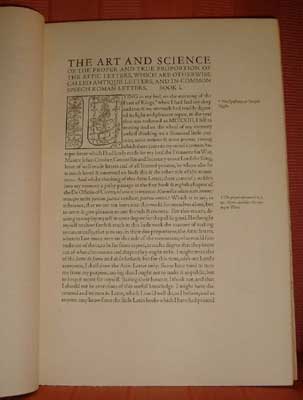
Aside posted:
In 325 BC, I discovered Literature. This technology leads to Music, and it also allows you to build two national wonders and a world wonder: the Heroic Epic, the National Epic, and the Great Library.
National wonders can only be built once per a civilization, but each and every civilization can build their own copy. In a given city, you can only build two national wonders total, so you have to plan ahead and build those national wonders where they'll create the most bang for your hammers.
The Heroic Epic gives you a +100% modifier to the base production of a city while that city produces military units. Therefore, you should be very careful to choose the very best place for this national wonder.
The National Epic doubles the number of Great Person Points you recieve in a city. Find a city with a lot of food and a lot of specialists, add in the National Epic, and watch the Great People multiply!
The Great Library gives a city +2 GPP scientist points, and also gives you two free scientist specialists in that city. In this early stage of the game, it is a teching powerhouse.
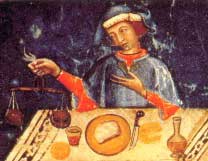
Habart Proso Rerikh -- Born 325 BC -- Died 247 BC -- 78 years
Habart was Proso's second son, and the eldest after his older brother died of consumption at the age of ten. Like his brothers, he had a talent for telling stories, but rather than writing, he instead honed his skills as a public speaker and merchant. At the age of fourteen, after five years of haggling with German fisherman along the coast, he married his wife and traveled to Moscow in order to seek his fortune. His German contacts proved fruitful, and after selling his knowledge of German sailing to an engineering contractor, he reinvested a tidy sum of his wealth in the iron coming out of the fresh Grozny deposit, and reaped incredible benefits as the throne bought his metal in order to forge swords. By 300 BC, he'd bred seven children, most of which were merchant moguls in their own right. It was at his insistence that the crown enslaved a labor force from the unruly peasant class and constructed the famous Moscow market, whose Ivory trade was the envy of the Classical world for almost two centuries.
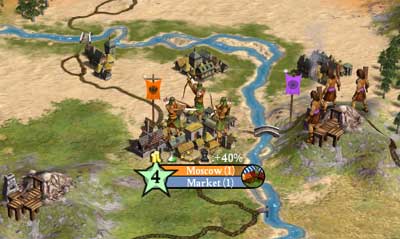
The city of Moscow was halved in order to build the market. Modern analysis suggests that the Market would have taken almost another 350 years to complete if Habart hadn't of rushed it.
Habart lived an extremely long life--despite the harsh treatments of his "doctors"--because he had an iron constitution. The eventual cause of his death is technically unknown, though most blame his mental condition. His youngest son, a converted Hindu, arrived at Habart's home to tell him that he had rejected Judaic law. Shortly thereafter, Habart became chronically depressed, and then died--as some say--of shame.Aside posted:
I whipped Moscow from 8 population to 4 and finished a market. Ow! Why did I do this? My current max happiness was six because I'd lost the benefits of Isabella's gems. Despite the fact that I had tried to maximize production, Moscow was still growing very quickly: so rather than let two unhappy workers sit around and waste food, I turned them (and a couple of other guys) into big hunks of production and finished a market. The market will give me +1 happiness from Ivory, and all the food around Moscow should expand the population in a handful of turns. This will cap my happiness effectively at six until the slavery anger wears off in ten turns.
Oh yea. And I asked around for free technologies from my friends, and Bismarck gave me Sailing! Yay! Now my trade routes extend along the coasts, and I can build lighthouses and galleys.
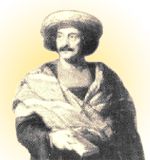
Iando Habart Rerikh -- Born 262 BC - Died 155 BC -- 107 years
Iando was Habart's youngest son, and his birth killed his mother, Habart's third wife. This made his father distant and impassive towards Iando, and explained Habart's willingness to pay Iando a lump sum to study away from home in the Judaic temples at Crimea. However, Iando remained interested in his father's businesses, and went so far as to quit the temples and ride along with the iron caravans out of Grozny. There, at the age of 19, he unknowingly fathered an illegitimate child with a prostitute. During his stay, Iando studied the Hindu texts which were popular with the Russian Hindus who worked the Grozny mines. At first they were a simple distraction, but over time, Iando grew to believe that he was in fact a Holy Man chosen by Krishna to spread Hinduism. In 250 BC, he returned to Crimea with a cadre of former laborers, and after meeting his father to renounce his Judaic roots, he used his father's money to found the first Hindu Temple of Crimea.
Within 25 years, his influence grew to incredible proportions. It is said that the concept of a code of laws was brought with him out of Grozny and introduced to the Russian Empire as a whole. Soon afterwards, the first rudimentary courthouses were constructed.
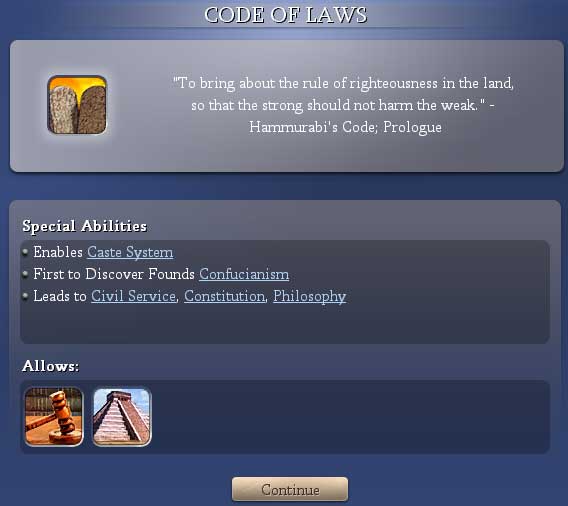
Iando lived a famously long life. As he approached the century mark, it was his age that converted more Crimeans to Hinduism than any other aspect of his personality. People began to believe that he was, in fact, a Holy Man. This created for a short period of time a common resistance to the military buildup preceding the Russo-Indian war.Aside posted:
I traded Currency to Ghandi for Code of Laws. Ghandi is pretty far behind in military tech, so Currency will not be enough of a teching boost to allow him to catch up before I conquer him; and I saved seven turns of teching for Code of Laws, which will speed up my acquirement of Civil Service and allow me to construct courthouses.
Next update, I'll talk about city maintenance, gold, commerce, civic costs, and how courthouses figure into all this.
Pukhlavich Iando Rerikh -- Born 243 BC - Died 223 BC
The illegitimate son of Iando Habart Rerikh, peasant, and father of Marshik Pukhlavich Rerikh. He ironically reclaimed his father's names through the courts that his father inspired. He did little else of consequence in his life.
Marshik Pukhlavich Rerikh -- Born 240 BC - Died 173 BC
Son of Pukhlavich Iando Rerikh, peasant, and father of Oleinik Marshik Rerikh. He was thrown in debtor's prison, in which he survived to an extreme age. The guardsmen of the prison coined the term "prisoner's beard" in reference to his massive, flowing white beard.
Oleinik Marshik Rerikh -- Born 201 BC - Died 150 BC
Participated in the construction of the Jewish Temple of St. Petersburg. Died of a heart attack. Fathered Otseslav Oleinik Rerikh.
Otseslav Oleinik Rerikh -- Born 160 BC - Died 100 BC
Otseslav became an apprentice woodcarver in Moscow. He fathered Milizce Otseslav Rerikh.
Aside posted:
These are the doldrums before I'm prepared for war. I've got a fair-sized stack building in Grozny for war on Ghandi. Let's take a look at it so that we don't go bored while I count off the years.
In a couple of turns, this stack will contain another swordsman, another elephant, and then after that, another two catapults. Once the war starts, I'll continue to feed the stack with fresh units. This should be fun. :]
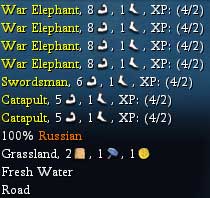
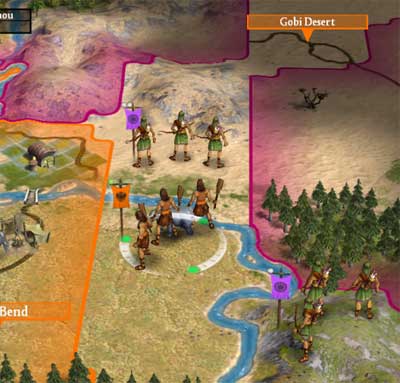
Milizce Otseslav Rerikh -- Born 130 BC - Died 70 BCAside posted:
Oho, what's this? It seems that Ghandi is getting pretty cocky. It's hard to see in the image, but that archer is escorting a settler. Why is he going to build a city all the way north past the Chinese border? I'm shadowing him with my warrior to see where he goes.
Shh! Be vewy vewy quiet. I'm hunting Ghandi.
Milizce was also a woodcarver; he specialized in string instruments. He fathered Evdokim Milizce Rerikh.
Evdokim Milizce Rerikh -- Born 100 BC - Died 50 BC
Became a master woodcarver of minor reknown. Fathered Konstantinovich Evdokim Rerikh.
Konstantinovich Evdokim Rerikh -- Born 73 BC - Died 17 BC
Became famous for creating the St. Petersburg seven, a series of early violins owned by the crown until their destruction in the Industrial era.
Nikolai Konstantinovich Rerikh -- Born 60 BC - Died 2 AD
Our primary story resumes with Nikolai, the third son of the master woodcarver. At the age of four, he already knew how to play the violin at a professional level. His father paid for him to travel to the court in Moscow at nine, and there he fell in favor with the king. It is said that every night, Peter asked him to write and play a new song. In order to maintain all those songs, Nikolai invented out of whole cloth the entire musical notation system still in use today.
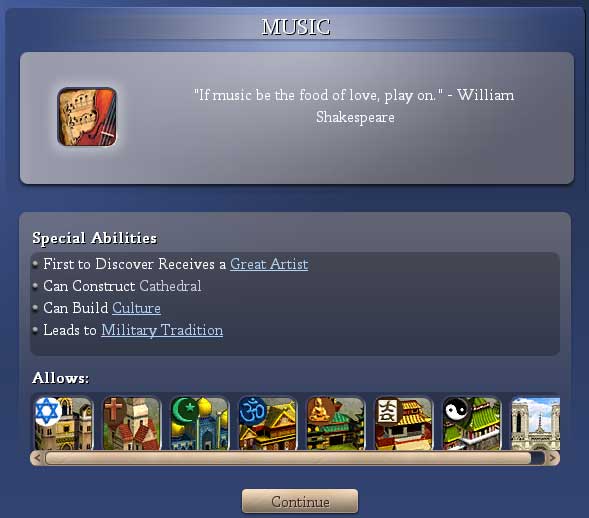
Unlike his ancestor Proso, Nikolai never had any children. But like Proso, he left behind an artistic legacy that the world will never forget.
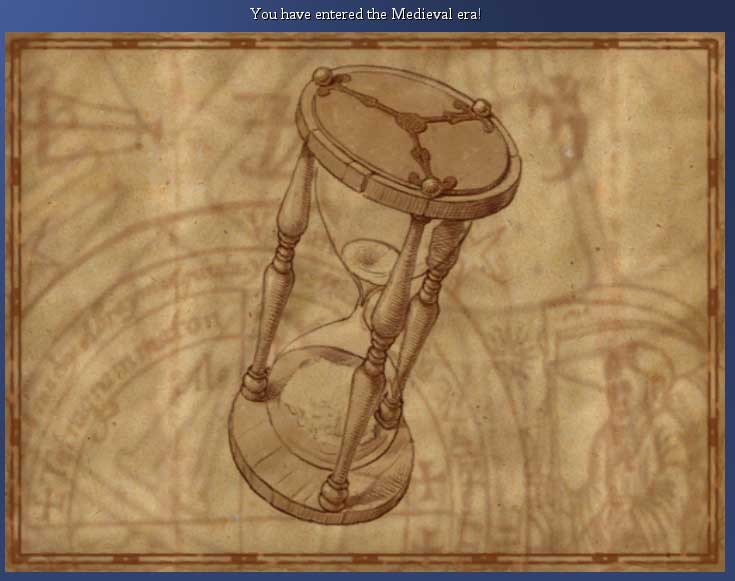
And so, with the invention of music, we enter the Medieval Era.
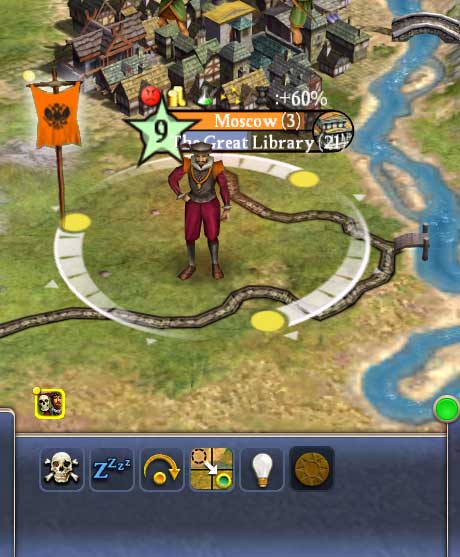
Because I've reached my narrative goal, and it's 4 AM, I'm done with this update 3 turns early.Aside posted:
Music is a powerful technology. Not only does it net you a free Great Artist, it also allows you to build the Notre Dame wonder (+1 happiness to all cities on this continent) and the cathedrals for each religion.
It also allows you to build culture, which is a feature I'll explain in a much, much later post.
The Great Artist has several neat tricks. Like the Great Scientist, he can start a Golden Age, settle as a super specialist, or discover a technology; but instead of founding an Academy, the Great Artist can create a Great Work. This necessitates an explanation of the culture system, however, which is again, for another time! Argh!
So far...
It's 25 AD. I used my Great Artist (from Music) to discover an artsy technology: DRAMA!
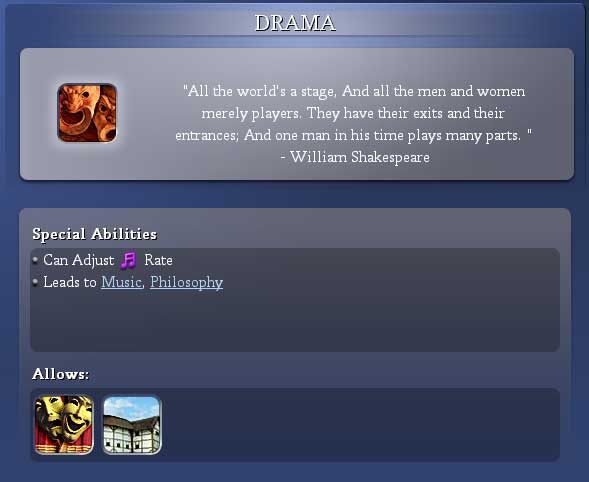
Drama allows me to build theaters (+3 cultural points, +1 happiness with dye, and +1 happiness per 10% money invested in culture!) and the Globe Theater national wonder. The Globe Theater makes the city it is built in immune to unhappiness.
In Moscow, I continue to build the Great Library. I've currently chopped four forests to rush it along, and I'll probably chop a few more. The tech and GPP boost I'd get from it would be tremendous.
I've started researching Monarchy in order to increase happiness. You'll see.
I want to start the next update with the event that happened in 50AD, so expect 23 turns tomorrow.
I'm not going to post new pictures of the world or the culture because nothing has changed, and war hasn't started yet. The same old maps still apply, except I've got a city settled in the spot Powercrazy reccomended earlier.
Oh yea, and I traded for Calendar with Bismarck, which I'll also explain my next update. I'm too tired to think. Too tired.
